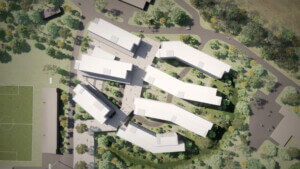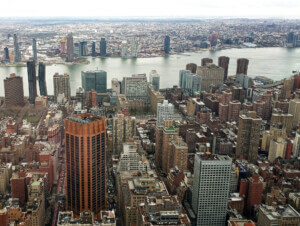Thanks to new rules, it appears that one historic downtown plaza will be free of large glass pavilions, for now.
For over a year developer Fosun had planned to build glass-clad entrances to retail spaces beneath the landmarked modernist plaza of 28 Liberty, designed by SOM in 1964. Although the Landmarks Preservation Commission (LPC) approved the renovations in August 2015, the project needed an additional—but contentious—green light from the community and the city to move forward.
The developer sought to change the site’s city-imposed deed restriction (convents that guide the use of land) to allow the pavilions, some as tall as 17 feet, to be constructed. Currently, the site’s deed restriction states that no object taller than six feet can rise from the surface of the plaza.
Deed restrictions are usually enacted for public benefit; by limiting use, they can thwart an owner’s ability to capitalize on the property. For months Manhattan Community Board 1, residents, and preservationists concerned about the integrity of the plaza debated whether to grant Fosun’s request.
For Fosun, a seemingly routine appeal for its plaza project couldn’t have come at a worse time.
The developer’s campaign to change the deed restriction coincided with the unfolding scandal over the transfer of Rivington House to a private developer. In that deal, the city lifted deed restrictions on the Lower East Side nursing home, a move that allowed a private developer to flip the site for a hefty profit. A series of public meetings revealed the convoluted nature of the deed-change process, with the mayor’s office and City Council offering two competing visions of reform.
In response, the Council passed a new law in December that lays out a standardized process for removal and modification of deed restrictions. Among other changes, the law’s public review component makes it much more difficult for property owners like Fosun to change deed restrictions.
“The developers basically told the board that they’re not pushing deed modifications now that the new rules are in place,” said Diana Switaj, Manhattan CB1’s director of planning and land use. Although community board resolutions on developments like 28 Liberty are non-binding, the city-sanctioned groups provide frontline community feedback on development in their jurisdictions.
When reached for comment, Fosun confirmed that it will not be building pavilions. “At this time, Fosun is focusing on creating hundreds of feet of new storefront, restoring the historic parapet to its original condition, and creating a larger plaza by removing mechanical components,” said Erik Horvat, managing director at Fosun Property, in a statement. “We continue to advance the effort to invigorate the plaza and bring some 200,000 square feet of new retail to Lower Manhattan. The site offers existing access points and we believe the new retail offerings will provide enormous benefit to the community. We will reevaluate the additional glass entryway pavilions in the future.”
This article appears on HoverPin, a new app that lets you build personalized maps of geo-related online content based on your interests: architecture, food, culture, fitness, and more. Never miss The Architect’s Newspaper’s coverage of your area and discover new, exciting projects wherever you go! See our HoverPin layer here and download the app from the Apple Store.










